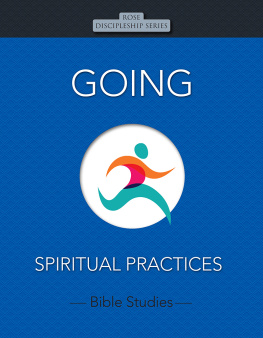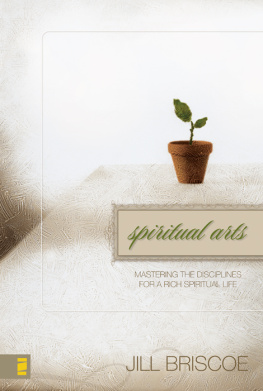The printed version of this eBook is the Spiritual Disciplines pamphlet, ISBN-13: 9781596363540
Authors: William Brent Ashby, BT; Benjamin Galan, MTS, ThM, Adjunct Professor of OT Hebrew and Literature at Fuller Seminary.
It is illegal to photocopy, transmit electronically, post on the internet, or reproduce this pamphlet in whole or in part in any form.
2009 Bristol Works, Inc.
Rose Publishing, LLC
PO Box 3473
Peabody, Massachusetts 01961-3473 U.S.A.
Email: info@hendricksonrose.com
www.hendricksonrose.com
All rights reserved.
Spiritual Disciplines
This handy eBook:
- Explains the 8 classic spiritual disciplines that help us follow Jesus, including prayer, fasting, worship, evangelism, Bible study, service, solitude, discernment, and evangelism.
- Includes a simple overview (5-7 bullet points), key verses, and examples/people from the Bible to use as modelsfor each spiritual discipline.
- Shares practical tips on how to get started (and stick with each discipline!). Fantastic for personal use, 1-on-1 discipleship, and small groups.
- Gives relevant insights on how to keep the focus on Christ (and not our own performance). It exposes 6 common misunderstandings about spiritual disciplines in churches today.
What are Spiritual Disciplines?
Understanding the power of sin over us will help us grasp the meaning and necessity for spiritual disciplines.
Sin
The Bible explains sin with several metaphors. Sin:
- Captures (Prov. 5:22; Heb. 12:1)
- Enslaves (Gen. 4:7; John 8:34; Rom. 7:14, 23; Gal. 3:22)
- Is deadly (Rom. 6:23; 5:12; Eph. 2:1)
- Is a sickness (Ps. 32:15; Isa. 53:5; Matt. 9:2, 5; 1 Peter 2:24)
- Is impurity (Zech. 13:1; Ps. 51:2; Isa. 1:18)
- Separates (Isa. 59:12; Eph. 2:1216; 4:18)
Sin disguises itself as habitsthat is, behaviors and thoughts that have become second-nature. Many of the sins we commit come so naturally to us that we hardly notice themwhether they occur while driving on a busy freeway, having conversations about other people, abusing substances or other harmful things that may temporarily make us feel better. Habits require time and repetition to become entrenched. These habits enslave us, lead us to deadly consequences, make us sick, corrupt us, and ultimately separate us from God. We have to unlearn many of these behaviors and learn behaviors that are fit for the citizens of Gods kingdom.
Spiritual disciplines are practices we do regularly that can help us change, with the power and grace of the Holy Spirit, our sinful habits into good habits that make us more like Christ and connect us closer to God.
Spiritual Disciplines and Salvation
We are saved by and through Gods grace alone. We can do nothing to earn our salvation. Spiritual disciplines are not behaviors or practices that make us right with God in any way. They are tools that the Holy Spirit can use to renew our hearts. When we practice spiritual disciplines:
- We recognize that Jesus is the King of our lives.
- We acknowledge that we belong to him alone.
- We also seek to live out the fruit of the Spirit in our lives: love, joy, peace, patience, kindness, goodness, faithfulness, gentleness, and self-control (Gal. 5:2223).
Spiritual disciplines do not help God to make our lives holy. Instead:
- They help us recognize Gods callings and promptings in our lives, and identify those areas in our lives that still need to be renewed.
- They make us sensitive and humble to follow Gods leading.
- They help us realize that we depend completely on Gods grace at every moment and for everything.
- They train and equip us to respond in a worthy manner when life throws problems and storms at us.
Spiritual Disciplines Should and Should Not Be
Spiritual Disciplines Should Be
- Instruments of Gods grace which, through the Spirit, transform us daily into people who reflect Jesus love, obedience, humility, and connection to God
- Activities that connect us deeply to other believers in our common desire to follow Gods will
- A source of humility and dependence on God
- Experiences that enrich our lives and the lives of those around us
- Activities that occur in the context of Gods whole body; spiritual disciplines, although often practiced alone, are not individualistic activities
- As much focused on building up Gods body as building up each believer
- Practices that give us hope, despite our failings and limitations. We can hope that he who began a good work in you will carry it on to completion until the day of Christ Jesus (Phil. 1:6).
- Practices that permeate every area of our lives
- Disciplines that help us train for the life of faith, hope, and love to which Jesus has called us
Spiritual Disciplines Should Not Be
- Heavy loads of impossible, unrealistic, or unfair expectations for people
- Benchmarks to judge peoples Christianity or maturity
- Individualistic attempts to be holy or perfect
- A measure of ones spiritual stature and strength
- A way to separate our religiosity from the rest of our lives
- A way to hide our sins with good works

Leah-Anne Thompson
Spiritual Disciplines and the Bible
Contemporary society is fascinated with spirituality. One can find all kinds of books about self-help or spiritual guidance and practices. How are Christian spiritual disciplines different from those offered in such books? The difference is simple, though profound.
Popular Spiritual Disciplines Are: | Biblical Spiritual Disciplines Are: |
For self-improvement | For the spiritual maturity of each person and the community as a whole |
For self-realizationthe fulfillment of ones abilities and potential | For realization of the fruit of the Spirit in ones life |
For self-sufficiency | For dependence on God and interdependence with other believers within Gods body |
Based on ones own work and dedication | Based on the work of the Spirit in our lives, the support and encouragement of all believers, and the effort of each believer. |
His divine power has given us everything we need for life and godliness through our knowledge of him who called us by his own glory and goodness. For this very reason, make every effort to add to your faith goodness; and to goodness, knowledge; and to knowledge, self-control; and to self-control, perseverance; and to perseverance, godliness; and to godliness, brotherly kindness; and to brotherly kindness, love. For if you possess these qualities in increasing measure, they will keep you from being ineffective and unproductive in your knowledge of our Lord Jesus Christ. 2 Peter 1:3, 58
The Apostle Peter is clear: God has given us all we need, and we must make every effort to grow.
Spiritual Practice
Practicing spiritual disciplines is not easy. Jesus reminded the disciples that believers would experience hatred and persecution (John 15:1825). Spiritual disciplines help us get ready for difficult moments: moments of persecution, temptation, doubt, and grief.



















